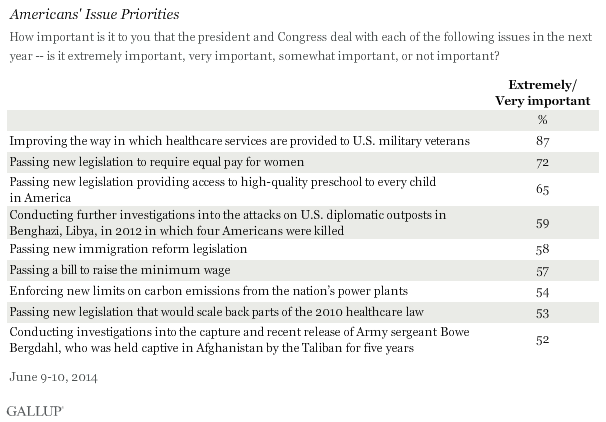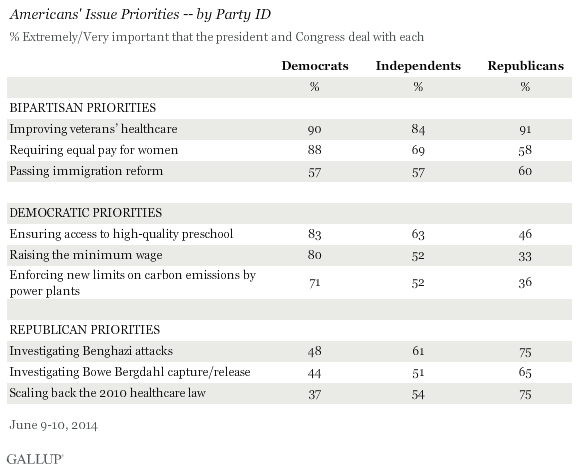PRINCETON, NJ -- Improving healthcare for U.S. veterans is Americans' top legislative priority for Washington to focus on, out of nine issues now or recently in the national spotlight. Nearly nine out of 10 Americans say it is "extremely" (41%) or "very important" (46%) that the president and Congress deal with veterans' healthcare in the next year.

After veterans' healthcare, 72% of Americans see a strong need for equal pay legislation for women, and 65% view expanding high-quality preschool as a top government priority.
Each of the six lower-ranked issues are rated extremely or very important by just over half of U.S. adults, ranging from 59% who want to conduct further investigations into the 2012 attacks on the U.S. diplomatic outpost in Benghazi, Libya, down to 52% wanting investigations into the circumstances surrounding the capture and release of Army Sgt. Bowe Bergdahl by the Taliban in Afghanistan.
These results are from a Gallup poll conducted June 9-10. The list focuses on specific policy issues currently being proposed or debated in Congress, rather than on the more basic policy areas that face the country. Gallup measured the perceived importance of 19 such broad policy areas in January, with the economy and education coming out on top.
Democrats and Republicans Agree on Importance of VA Repairs
Republicans and Democrats agree more about the importance of some issues than others, but they are completely unified in assigning high importance to improving veterans' healthcare. Nine in 10 Americans from each party consider the veterans issue highly important for the president and Congress to address, including more than four in 10 calling it extremely important.
Although majorities of all party groups say passing legislation to require equal pay for women is highly important, this ranges from a simple majority of Republicans (58%) to the vast majority of Democrats (88%). Additionally, about six in 10 Democrats and Republicans, alike, consider passing new immigration reform legislation highly important, although it is not clear from this question whether the two groups agree on what that reform should involve.
All other issues measured in the poll are more polarizing. Large majorities of Democrats, but fewer than half of Republicans, rate providing access to high-quality preschool, raising the minimum wage, and enforcing new limits on carbon emissions as top priorities. On the other hand, conducting further investigations into the Benghazi attacks, investigating the circumstances surrounding Bergdahl's capture and release, and scaling back the 2010 healthcare law are all issues that most Republicans, but not most Democrats, see as important.

Not surprisingly, there is a slight gender gap on the equal pay issue: 80% of women consider it extremely or very important that Washington enact legislation requiring equal pay for women, compared with 64% of men.
Bottom Line
Just weeks after new information about mismanagement and corruption at a number of Veterans Health Administration hospitals around the country came to light, the Senate and House of Representatives are poised to send legislation to start remedying the situation to President Barack Obama for his signature. The strong show of bipartisanship in this quick action is mirrored in Americans' nearly universal agreement that federal lawmakers need to focus on improving how the country provides healthcare to veterans. Whether Americans are ultimately satisfied that the Veterans Affairs bill goes far enough remains to be seen, as only some of the policy prescriptions Americans had for the VA in a recent Gallup poll are included in the legislation.
Meanwhile, proposals that would strengthen the ability of women working in the private sector to receive equal pay, such as the Paycheck Fairness Act, could potentially gain some momentum in Congress this year, considering the broad bipartisan support Gallup finds among the public. However, given their lopsided political constituencies, a number of other proposals -- particularly raising the minimum wage, passing new pollution regulations, and scaling back the 2010 healthcare law -- are almost certain to languish as the midterm elections near.
Survey Methods
Results for this Gallup poll are based on telephone interviews conducted June 9-10, 2014, on the Gallup Daily tracking survey, with a random sample of 1,012 adults, aged 18 and older, living in all 50 U.S. states and the District of Columbia.
For results based on the total sample of national adults, the margin of sampling error is ±4 percentage points at the 95% confidence level.
Interviews are conducted with respondents on landline telephones and cellular phones, with interviews conducted in Spanish for respondents who are primarily Spanish-speaking. Each sample of national adults includes a minimum quota of 50% cellphone respondents and 50% landline respondents, with additional minimum quotas by time zone within region. Landline and cellular telephone numbers are selected using random-digit-dial methods. Landline respondents are chosen at random within each household on the basis of which member had the most recent birthday.
Samples are weighted to correct for unequal selection probability, nonresponse, and double coverage of landline and cell users in the two sampling frames. They are also weighted to match the national demographics of gender, age, race, Hispanic ethnicity, education, region, population density, and phone status (cellphone only/landline only/both, and cellphone mostly). Demographic weighting targets are based on the most recent Current Population Survey figures for the aged 18 and older U.S. population. Phone status targets are based on the most recent National Health Interview Survey. Population density targets are based on the most recent U.S. census. All reported margins of sampling error include the computed design effects for weighting.
In addition to sampling error, question wording and practical difficulties in conducting surveys can introduce error or bias into the findings of public opinion polls.
View survey methodology, complete question responses, and trends.
For more details on Gallup's polling methodology, visit www.gallup.com.
